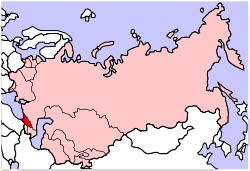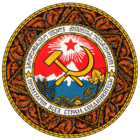Georgian Soviet Socialist Republic
| საქართველოს საბჭოთა სოციალისტური რესპუბლიკა (Georgian) Грузинская Советская Социалистическая Республика (Russian) Georgian Soviet Socialist Republic |
|||||
|
|||||
|
|||||
 |
|||||
| Capital | Tbilisi | ||||
| Official language | Georgian, Russian, Abkhaz (in the Abkhazian ASSR) and Ossetic (in the South Ossetian AO) | ||||
| Established In the Soviet Union: - Since - Until |
February 25, 1921 December 30, 1922 December 26, 1991 |
||||
| Area - Total - Water (%) |
Ranked 10th in the USSR 69,700 km² negligible |
||||
| Population - Total - Density |
Ranked 9th in the USSR 5,337,600 (1989) 62.2/km² |
||||
| Time zone | UTC + 3 | ||||
| Anthem | Anthem of Georgian SSR | ||||
| Medals | |||||
The Georgian Soviet Socialist Republic (Georgian: საქართველოს საბჭოთა სოციალისტური რესპუბლიკა sakartvelos sabch'ota socialist'uri resp'ublik'a; Russian: Грузинская Советская Социалистическая Республика Gruzinskaya Sovetskaya Sotsialisticheskaya Respublika), also known as the Georgian SSR for short, was one of the republics that made up the former Soviet Union.
History
- Main article: History of the Georgian SSR
On November 28, 1917, after the October Revolution in Russia, there was established aTranscaucasian Commissariat headed by Mensheviks in Tbilisi.

The Socialist Soviet Republic of Georgia was established on February 25, 1921. On March 2 of the following year the first constitution of Soviet Georgia was accepted.
From March 12, 1922 to December 5, 1936 it was part of the Transcaucasian SFSR together with the Armenian SSR and the Azerbaijan SSR. In 1936, the TSFSR was dissolved. During this period the province was led by Lavrentiy Beria, first secretary of the Georgian Central Committee of the Georgian Communist Party[1]
Under Khrushchev, the government was decentralized and the Georgian Communist Party rose in power. Alongside it, a black market economy and corruption grew. Eduard Shevardnadze worked for years to fight this corruption from the mid 1960s until 1985, when he was appointed Soviet Foreign Minister.
On October 28, 1990, democratic parliamentary elections were held, and on November 15 the nation was renamed the "Republic of Georgia." It declared independence on April 9, 1991, under Zviad Gamsakhurdia. However, this was unrecognized by the Soviet government and Georgia was in the USSR until its collapse in December 1991.
References
- ↑ .Geronti Kikodze (1954) Notes of a Contemporary, first published in 1989, Mnatobi, Issue 1, Tbilisi, Georgia.
External links
- Georgia, land of the Golden Fleece, reveals its riches a propaganda pamphlet about the GSSR from the 1960s.
 Map of the Georgian Soviet Socialist Republic in 1922 |
 Map of the Georgian Soviet Socialist Republic in 1957-1991 |
|
||||||||||||||
| This Georgia-related article is a stub. You can help Wikipedia by expanding it. |
| This Soviet Union-related article is a stub. You can help Wikipedia by expanding it. |


